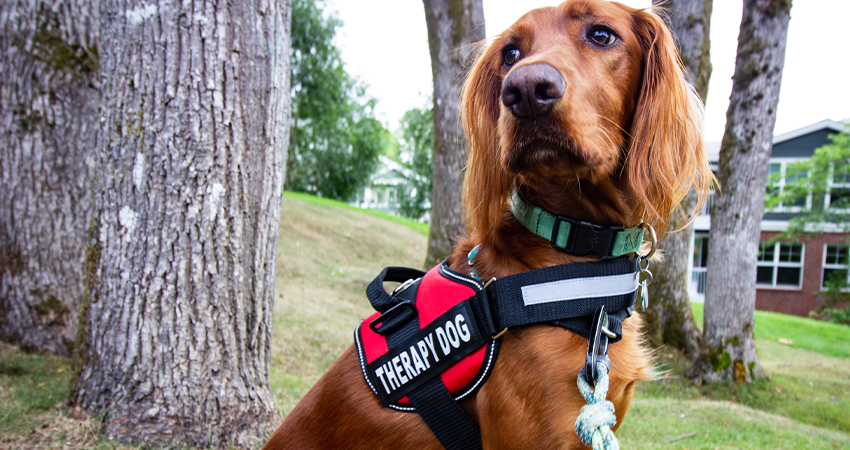If you are a pet owner, you’ve probably experienced the many therapeutic and emotional benefits that animals provide. It can be something as simple as coming home after a bad day and being greeted very enthusiastically by your dog or taking your horse for a long trail ride. Pets are great at helping us get through life’s daily challenges whether they are specially trained as a therapy animal or not.
Today, therapy animals serve in many different environments and provide a variety of benefits to humans. Most therapy animals are used to provide comfort, cheer, and even companionship and in the process, change people’s lives. From helping children with learning disabilities, to providing comfort after medical procedures, to helping trauma victims – therapy pets of all shapes and sizes, provide relief and support.
The most common therapy animals are dogs. Big, small, long-haired, or hypoallergenic, any type of dog can be trained to be a therapy dog. Although labs are often used, as long as a dog has the right temperament and passes training, there really aren’t any restrictions on the type of dog that can provide comfort. Most often, it’s personal preference.
Cats are also used as therapy pets, most commonly when someone is afraid of dogs. If you’ve ever owned a cat, you know they can be more difficult to train than a dog and often don’t transport as well. They may also not be able to perform the same medical tasks as a dog, however cats are great pets to have in senior living communities – often making their rounds from room to room, checking on their favorite people, and even taking naps or snuggling with residents.
Horses are a popular choice for some individuals. Caring for these animals does take a lot of time and attention which can offer a break from disruptive thoughts or behaviors. Horses are great therapy animals for people who need to gain confidence, ease anxiety, overcome trauma or learn patience. They require a lot of mutual trust and interaction. Working with horses is also scientifically proven to lower blood pressure. It can aide in anger management and behavior issues as well since a horse will not respond unless it feels respected and respects its rider.
Small animals like rabbits, guinea pigs, ferrets, or chinchillas can be a convenient form of therapy as well. They have been shown to offer comfort, companionship, enhance fine motor skills, and ease emotional/behavior issues. They are easier to contain and care for than their larger counterparts.
Reptiles are new to the therapy animal pool but since they take a great deal of concentration to care for, they offer individuals a break from physical, mental, or emotional struggles. Since many people have never owned a reptile, they often gain confidence by caring for them because it’s something new and different at which they are succeeding.
Birds, or more specifically parrots, are known to have a high level of empathy. They can be taught words or phrases which aid in helping those with certain psychological issues. Bird sanctuaries have been known to help veterans deal with PTSD as they work to help abused birds.
Farm animals – mini-horses, goats, and llamas – have become very popular therapy pets over the past few years. Goats have become welcome guests in yoga classes across the country, where they love to cuddle with yogis. “Therapy goats don’t need a bond with a human,” says Lainey Morse, founder of Goat Yoga, “so when they walk right up to a person and start to snuggle, or climb on their laps, or lay on their mat — it makes that person feel so special.” Llamas bring fuzzy joy to senior centers and hospitals in the area. While provoked llamas may spit and kick, most just want to make new friends. Mini horses are just small enough to bring indoors, and their mild temperaments make them a calming presence.
Anyone who has owned an animal has seen first-hand the compassion and benefits animals provide. Whether certified, trained for therapy sessions or simply a companion, the positive impact of an animal in any capacity are undeniable.

